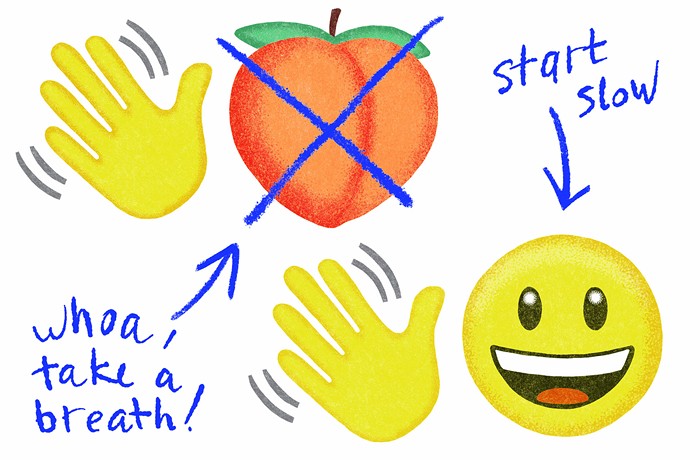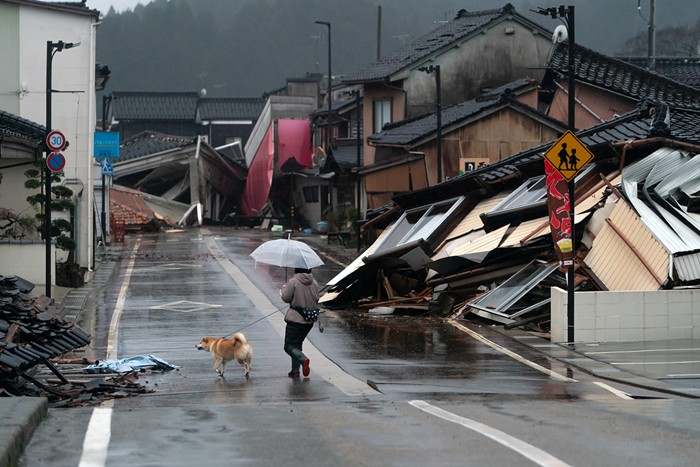In the popular imagination, summer is the season of mindlessness. Summer films mean big, dumb blockbusters that allow, even require, you to suspend your critical faculties and revel in the exploding superheroes. Likewise with summer reading, summer love, summer jams: The emphasis is always on escape and carefreedom, the joys of indulgence and insubstantiality. Songs about the season, by everyone from George Gershwin to Mungo Jerry, invariably sell this same bill of goods: In summertime, the livin' is easy; two bare feet on the dashboard/young love and an old Ford; everybody frontin' and maxin'/chillin' in the car they spent all day waxin'; we're always happy; a regular free-for-all.
Well, not for all.
For some of us, summer is the season of dread, because, for all its many charms, it's also the season during which taking off one's clothes in public becomes customary, at times even compulsory. While I am spiritually and voyeuristically 100 percent on board with partial and total public nudity among those who choose to engage in it (a segment of the population I envy as deeply as some people envy millionaires), my own relationship to bodily exposure is a joint-freezing, breath-seizing nightmare. To couch it in terms of the ranking phobias in American life, I would rather address a large audience while sealed in a coffin aboard a free-falling airplane infested by poisonous spiders the size of Alaskan king crabs than take my shirt off at the beach.
"Are you ready for the summer?" asks the song from Meatballs. "It's complicated," comes the invariable answer.
If you've spent any time in your life being noticeably overweight, you're likely to know what I'm talking about. If you haven't, you're equally likely to have no clue how anyone could be so foolish as to deny himself the birthright of feeling the sun's rays on his bare skin. And of course, both yous are absolutely right. While comment-thread trolls (go right ahead, you worthless dicks; I won't be reading) and identity bloggers might disagree, the issue at issue isn't about cultural norms or beauty standards or privilege or tyranny. It's simply about the hyperconsciousness that permeates every waking second of body shame running aground in the absence of such consciousness.
As long as we're all celebrating independence this week, it seems as good a time as any to spill a few words considering its opposite: not dependence, but bondage. Not bondage to fitness or fatness or the beauty myth or any of the other tropes that attend the public conversation about the American obesity epidemic—which is, I'm only the tiniest bit relieved to acknowledge, not my subject here—but to the ineradicable certainty that one's own form is an encyclopedic aberration. This consciousness infects and infests every interaction with everyone you meet. You believe it is what everyone is really thinking. You see it in everything. It makes you late because you're compelled to change clothes 10 times before you settle on what to wear—and having settled, makes you wear the same outfit for days in a row, thinking you may have finally cracked the code of fooling the world into thinking you, too, are a human being. You get stuck in mirrors, performing contortions to try to discern the angle from which someone might mistake you for a peer. You pick at your clothes incessantly, trying to make them hang just so, the way normal people's garments hang. It makes young guys wear T-shirts in swimming pools (the suckerest bet of all time), turns gym locker rooms into high-speed gauntlets. Dinner parties become minefields. Preposterous fallacies—it's impossible for thin people to have real problems; eating disorders are a blessing—become obvious truths. Your appearance obsesses you, not because you are vain (though you might also be vain), but because you're unshakably convinced that your body is not simply unappealing, not merely unacceptable, but legitimately offensive to behold. You cancel plans because you simply can't allow yourself to be perceived. You feel like you're covered by ants. You would rather be covered by ants. You dream of shitting out your insides to transform your appearance. You fantasize about falling into a coma and waking up wasted away. You know that every time you enter a room, everyone in it is shocked by your appearance, such that your absence would lubricate the social intercourse. You doubt people who claim to be attracted to you and maintain a running countdown to the moment they finally admit it. You think of your body as a misshapen prison and your mind as the true locus of the self. You may even fetishize this misapprehension to the extent that it becomes the cornerstone of your personality, a bulwark against situations (beaches, dance floors) in which physical presence is preeminently valuable. It is the first thing you see in the morning and the last thought you have at night. Worst of all, even when you understand that all these things are objectively not true, you still know them as surely as the religious believe in their deities and gamblers in their chances. The processes are governed by a similar surrender to a malignant form of magical realism. It's an unedifying irony that the word "dysmorphia" is kind of beautiful. Alas, it's not as fun as it sounds.
Some people, regardless of the shape of their bodies, simply don't give a fuck. These people are lucky, maybe even holy. Others, and here I include myself, spend the summer on constant alert for signs that someone in their circle will declare that it's time to go swimming (or indeed skinny-dipping, a whole 'nother discussion), followed by a chorus of cheering affirmation haunted by the conspicuous silence of the one person in the group who can't, who simply cannot, bear the thought of baring his/her physique to the world. Thus begins the countdown to the moment of—well, not truth, exactly... but the crucial moment, when the exposurephobe must make the excuse that allows him/her to remain dressed while everyone else cavorts, revels, and displays. Too much work to do, beach too crowded, too tired, too whatever it takes to not drop the last layer of armor between your body and the disdainful eyes of, frankly, almost everyone else. It's bad enough to be excluded (by choice, by nature, by good old-fashioned prudishness) from one of the sweetest rituals available to humankind, but one thing is worse: being aggressively included.
This is the moment when the thing you're most terrified of becomes the subject before the group, when a gaggle of nearly naked friends, enemies, peers, and rivals begins shouting at you to strip off the only protection you have in the world against the thing you dread worse than death—far worse; death would be welcome. A gang of laughing voices commanding you to disregard the elephant stampede of horrible feelings that assault you more intensely with each "Come on!" and jump in the disgusting murk of weedy, reedy (and always, always freezing fucking cold) lake water while they watch. This has happened to me at least a dozen times in my life, during periods of both relative leanness and full-blown corpulence, with people I know well and love, and who know and love me, and each time was exactly the same as every other: the absolute worst. I have responded to it with explosive petulance, sheepish resignation, fake enthusiasm, sudden flight, and grim silence. In all cases, the people in the water—ironically, the best place to conceal an ignominious form—had no idea their exhortations to be one of them only compounded the paralyzing shame of knowing that I wasn't, and could never be, no matter how much weight I ever lose, or gain, or lose again.
One hears a lot about different kinds of shaming in the current discourse on privilege—body-, slut-, gender-, and otherwise. And while it's probably a good idea for everyone to consider the way they treat other people, I'm not entirely sure the transitive form of the verb applies in this case. To be sure, I have been brutally mocked for my appearance, by friends, enemies, strangers, and family, more or less for my whole life. Still, most people never say a word about your appearance, because they don't notice, don't care. Regardless, the idea that others are in any way responsible for the dread I feel at a crowded shoreline rings false to me. Once you're out of school, it's not the rudeness or deliberate ostracism you're afraid of. My fear is about what people will think far more than what they might say, and no one can be blamed for what he/she thinks. Most of the time, you don't get to know what anyone else thinks, but that hardly matters, because I know what I think, and I don't think I think it because society has conditioned me to via some fascistic beauty standard. (Women obviously experience this on a whole other level, but if you think men aren't held to a magisterial appearance ideal by men and women alike, try taking 20 or 30 extra pounds with you into the palace of privilege sometime.)
It's not about being or feeling attractive. It's about belonging to the class of the objectively acceptable. Scorn-dread follows the fat and once-fat around like the dust cloud follows Pigpen in Peanuts. It originates within, derived from the obvious disparity between our own appearance and the appearance of almost everyone else. The contempt of normals is unmistakable, be it masked by warmth, tempered by sympathy, denied on ideological grounds, or not even conscious. Just as the Jewish character in Chariots of Fire notes about English anti-Semitism, "You catch it on the edge of a remark," so too can revulsion for the endomorph be detected in the disappointed gaze of even the politest company. Bias against the overweight, particularly in situations where the whole point is bodily display, is involuntary, reflexive, evolutionary. It seems to exist on a species level. It's the tolerance that seems learned.
This anxiety, like all anxieties, exists entirely in the psyche of the anxious, and has very little to do with other people. That doesn't mean it's imaginary, however. It's not about self-esteem, or even self-involvement, but it is about the self in relation to the rest of the world. You need not think of your body as grotesque or freakish (two of many negative adjectives I used in the above paragraphs and deleted upon further consideration) to understand that other people are likely to. Here rests the sad corollary to the old Platonic adage about beauty being in the eye of the beholder. I'm sure I'm not the first to understand that the absence of beauty is in there, too, which is all the proof a non-beauty ever needs.
It was tempting to use this space as a critique of the summer industrial complex, comparing it to the mania for acquisition that gets pumped down our gullets every holiday season by the corporate forces that manipulate our collective mood, transforming natural season cycles into different colors of predetermined sentiment, the better to organize our shopping impulses and keep the economy chugging along. "Happiness is, after all, a consumption ethic," wrote Joan Didion in "Notes from a Native Daughter." But let's be serious. I can aestheticize my phobias all the livelong day, and it can't alter the fact that summer is great. It's just better for people who are thin and attractive. Like everything in the goddamn world. ![]()


















